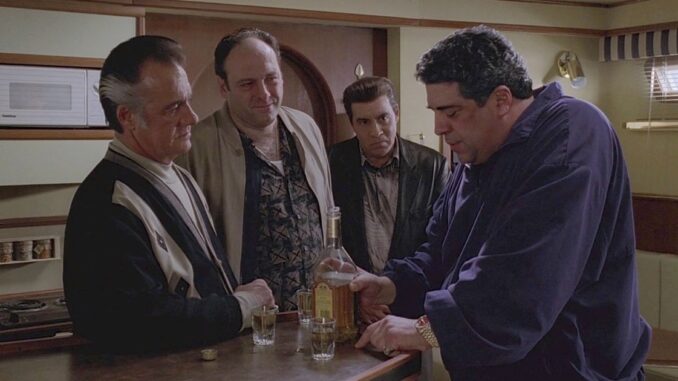
Despite more than 20 years passing since it began, HBO’s hit crime series The Sopranos remains the absolute gold standard of television drama. Throughout its six-season run, it covers the complicated life of Tony Soprano (James Gandolfini), who struggles to balance his work as a crime boss in New Jersey with his family life and, secretively, attends therapy sessions to get help.
All six seasons and 86 episodes are essential viewing for lovers of great television and crime drama, but for those who just want to get a taste of what The Sopranos has to offer at its best, these 10 episodes present a great starting point. Covering everything from Tony’s family dramas to the violence of the gang, and even to Dr. Melfi’s (Lorraine Bracco) own struggles, these 10 instalments of The Sopranos are perfect for beginners.
Where better to start than at the start? The pilot episode, “The Sopranos,” adequately introduces viewers to the tumultuous life that Tony Soprano leads. After passing out at a family barbeque, New Jersey mobster Tony Soprano begins seeing a psychiatrist, Dr. Melfi, to better understand what happened and how he can manage it. Having learned that he suffers from panic attacks, Tony starts to view his life in a different way, even as the violence and chaos of the crime world rages around him.
The pilot episode is a masterpiece of introductory storytelling, establishing the action, stakes, and core characters instantly while still leaving plenty of room for development to come. Admittedly, it is far from the best episode of the series, but “The Sopranos” is the optimal starting point for new fans, allowing them to get a taste for what the show is, who the characters are, and the intricate and personalised dilemmas many of them are facing.

Viewed by many not only as the best episode of Season 1 but possibly as one of the greatest television episodes from any TV show ever, it wouldn’t be an overstatement to describe “College” as one of the most important hours in television history. Still early in its run, fans were growing accustomed to The Sopranos serialized story, and the fifth overall episode served as an emphatic exclamation mark on the series’ brilliant writing and excellent performances.
A relatively quiet episode, it follows Tony and Meadow (Jamie-Lynn Sigler) as they visit a college, during which time Tony spots a former associate who became an FBI informant, and decides to kill him. The episode is gritty and quite shocking when it needs to be, depicting an even darker side of Tony Soprano compared to what audiences had seen. It is fondly remembered as one of the best episodes, and is a perfect candidate for new viewers wanting to see the series’ highlights.
The Season 2 finale, “Funhouse” is yet another revealing episode for Tony Soprano while also being one of the first entries in the series to use the surreal allure of dreams as a powerful storytelling device. The episode focuses on Tony Soprano as he struggles with a bout of food poisoning while having to attend Meadow’s graduation ceremony and handle an issue relating to a treacherous friend. It also saw Tony put his nephew, Christopher Moltisanti (Michael Imperioli) forward to be a made man.
While the season’s penultimate episode, “The Knight in White Satin Armor,” contained one of the series’ most shocking deaths, it is the slow, drawn-out demise of the gang’s FBI informant that makes “Funhouse” such a captivating watch. With a magnificent performance from Gandolfini, an enthralling dreamscape, and plenty of the series’ trademark writing on display, “Funhouse” is widely viewed as being one of the greatest episode of The Sopranos.
The single greatest episode in the context of Dr. Jennifer Melfi as a character, “Employee of the Month” is a shocking episode, infamously depicting Dr. Melfi being sexually assaulted in the garage of her office building. However, the episode is smart to gloss over the attack itself quite quickly, and spend more time exploring how Melfi is affected in the aftermath, and how it makes her reconsider and doubt her treatment of Tony Soprano.

It has some powerful and rage-inducing moments, such as the culprit being let free from custody on a technicality. It is then made abundantly clear how desperately Melfi craves some form of revenge and how aware she is that one word to Tony during a meeting could secure it. Dr. Melfi was always a central female presence on the show, and “Employee of the Month” displayed her at her complicated best while touching on the allure and power that can make organised crime so appealing.
When necessary, The Sopranos was capable of exhibiting a brand of violence that was strikingly confronting, shaking audiences to the core. One of the most memorable and pivotal episodes in this regard was Season 3’s “University.” It sees Meadow and Noah (Patrick Tully) hit a rough patch in their relationship, while Tony becomes incensed with Ralphie (Joe Pantoliano) when he beats one of the girl’s from the club to death after informing him she was pregnant with his baby.
Given it was a series focusing on violent men, The Sopranos never shirked issues of misogyny and violence against women, with the harrowing scene of Tracee’s (Ariel Kiley) death one of the most unforgettably upsetting in television history. It also gives fans fascinating insight into Tony’s complex and, at times, contradictory sense of morality, a quality that went a long way to defining him as arguably the greatest television character of all time.
A brilliant episode for the supporting characters, “Second Opinion” saw a rift emerge between two leaders in Tony’s gang, while Carmella (Edie Falco) and Uncle Junior get new perspectives on their predicaments. Tony confronts Angie Bonpensiero (Toni Kalem) about talking to Carmela about her financial woes, Christopher takes issue with Paulie’s actions, Uncle Junior consults a new doctor concerning his cancer treatment, and Carmela’s reluctant meeting with a disapproving new therapist forces her to reconsider her attitude towards her lifestyle as the wife of a mob boss.
It is one of the most intriguing episodes in the context of Carmela Soprano, with Edie Falco winning her second Primetime Emmy in the role for her performance in the episode. It was a great episode for many of these characters because they were forced to confront their own flaws, all of which were directly related to the benefits and limitations they faced as a direct result of being in Tony Soprano’s inner circle.
When The Sopranos was operating at its very best it was capable of scintillating drama and stomach-turning tension, but it was also adept at laugh-out-loud comedy. Few episodes exemplify this quite like Season 3’s endlessly rewatchable “Pine Barrens.” Tony confides in Dr. Melfi about his extra-marital relationship with Gloria (Annabella Sciorra), while Paulie (Tony Sirico) and Christopher’s efforts to collect from a Russian commando lead to them getting lost in the pine barrens in South Jersey.
The duo’s squabbling antics define the excellence of the episode, with Paulie and Christopher’s relationship, which was already at breaking strain, being hilariously tested throughout their pursuit. With its mixture of high-stakes drama and outrageous comedy, “Pine Barrens” has come to be viewed among the greatest episodes of the series and is an essential watch for all who love great modern television.
Probably the greatest exhibition of James Gandolfini and Edie Falco’s chemistry and individual brilliance on the series, the Season 4 finale is widely regarded as being one of The Sopranos’ most powerful episodes. It holds its focus on the deterioration of Tony and Carmela’s marriage, with Carmela kicking Tony out of the house after catching him in yet another affair. Additionally, it also sees Christopher exit rehab with a more positive outlook while Tony’s issues with the New York mob threaten to boil over.

Narratively thrilling while showcasing many of the series’ characters at their most complex, “Whitecaps” loads its extensive, 75-minute runtime – the longest episode of the series – with scintillating drama. Gandolfini and Falco both won their third Primetime Emmy awards for the series with their incredible performances which are simply must-watch for all fans of exceptional acting and television.
The best episode of Season 5, “Long Term Parking” saw the season’s plot threads careen towards an exciting ending while serving as another significant chapter in the context of Tony and Carmela’s relationship. With Tony and the New York bosses all squabbling, Tony tries to protect his cousin Tony B (Steve Buscemi) while Adriana’s (Drea de Matteo) work as an FBI informant comes to a decisive ending.
With its 56-minute runtime, the penultimate episode of Season 5 is a terrific example of how much the series can pack into individual episodes. While it’s a huge episode for Tony who reconciles with Carmela and struggles to appease other mafiosos in New York, “Long Term Parking” will long be remembered for de Matteo and Michael Imperioli’s outstanding performances, with both actors winning Primetime Emmys for their work, while Terence Winter won an Emmy for his writing of the episode.
The overall series finale was incredibly contentious when it first aired in 2007, but “Made in America” has come to be viewed more positively in hindsight as the enigmatic and abrupt ending has come to be better understood. Narratively, it revolves around the Soprano family having to stay in hiding until Phil Leotardo (Frank Vincent) is dealt with. However, it also depicts one final meeting between Tony and a dementia-riddled Junior (Dominic Chianese), A.J. And Meadow moving on with their lives, and an ambiguous resolution to Tony’s troubles.
Its legacy can only be described as enduring, with “Made in America” still serving as a topic of conversation with notable presence in modern pop-culture circles. Brilliantly, while the episode still has some critics who view it as being a betrayal of the fans’ trust, its incredible power has only enhanced over time.
